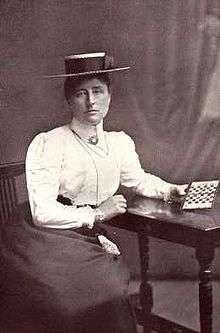Edith Baird
Edith Elina Helen (Winter-Wood) Baird (February 22, 1859 – February 1, 1924) was a chess composer who in her day was the most prolific composer of chess problems in the world.[1] She published under her married name as Mrs. W. J. Baird and was sometimes referred to in the press as the "Queen of Chess".[2]

Early years and family
Edith Elina Helen Winter-Wood was born at Hareston Manor near Plymouth in the United Kingdom, the daughter of Thomas Winter-Wood, a writer, and Eliza Ann (Sole) Winter-Wood.[3][4] She learned to play chess early in life as her father, her mother, and her older brothers Edward and Carslake were all either amateur or tournament-level chess players.[3]
In 1880 she married W. J. Baird, Deputy Inspector-General of Hospitals and Fleets for the Royal Navy.[3] They settled in Brighton, where their only child, Lilian Edith, was born. Lilian also went on to become a chess composer.[3]
Chess composition
In the mid 1880s, Baird started composing chess problems and within a few years had gained a reputation in the field.[3] In 1888, she took third prize in a Sheffield chess-composition tournament, the first of over two dozen subsequent prizes.[2] Her most celebrated success came in 1893 when she won an international chess-composition tournament against a number of the most notable chess composers of the day.[3] She became the most prolific composer of chess problems in the world, with over 2000 problems to her credit.[1] These were published in newspapers such as the Times of London.[2] Some of these are still considered sound, many are considered elegant, and some are novelties such as letter problems, in which chess pieces have to form the shapes of letters.[2][3]
Baird published two books of her problems: Seven Hundred Chess Problems (1902) and The Twentieth Century Retractor (1907).[5][6][3] The first book took her 14 years to complete.[1]
As a chess player herself, Baird won the Sussex Ladies Championship in 1897 and a silver medal in the tournament three times.[2][3]
References
- Kavalek, Lubomir. "Chess". Washington Post, July 20, 2009.
- Gittins, F.R., ed. The Chess Bouquet, or, The Book of the British Composers of Chess Problems. Fielden McAllan & Co., 1897, pp. 9–11.
- "Edith Elina Helen Baird - née Winter-Wood (1859 - 1924)". Chess Devon, August 25, 2008.
- "No. 1 - Thomas Winter-Wood (1818-1905)". Chess Devon, August 25, 2008.
- Seven hundred chess problems, selected from the composition of Mrs. W. J. Baird. London: Henry Sotheran and Co. 1902. Retrieved 29 April 2019 – via HathiTrust.
- The Twentieth Century Retractor, Chess Fantasies, and Letter Problems: Being a Selection of Three Hundred Problems by Mrs. W. J. Baird... Enriched with Shakespearean Quotations. London: Henry Sotheran and Co. 1907. Retrieved 29 April 2019 – via Internet Archive.